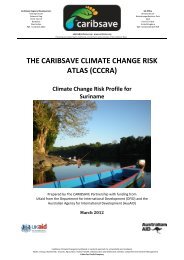Create successful ePaper yourself
Turn your PDF publications into a flip-book with our unique Google optimized e-Paper software.
7.3. Energy Supply <strong>and</strong> Distribution<br />
There can be little doubt that tourism is an important <strong>and</strong> growing energy-consuming sector in the<br />
Caribbean. If this growth continues, vulnerabilities associated with higher energy prices as well as global<br />
climate policy will grow concomitantly.<br />
Any Caribbean nation’s ambition should thus be to reduce its energy use <strong>and</strong> to increasingly use renewable<br />
energy produced in the region. In practice, this appears to be hampered by the lack of detailed databases<br />
on energy use by sub-sectors, which is a precondition for restructuring energy systems. To this end, Francis<br />
et al. (2007: 1,231) suggest that:<br />
Finally, given the absence of a more detailed database on energy consumption <strong>and</strong> GDP in Haiti,<br />
Barbados, <strong>and</strong> Trinidad <strong>and</strong> Tobago, further research can be directed at two important issues.<br />
First, with wider data on energy consumption <strong>and</strong> GDP (total <strong>and</strong> sectoral), a decomposition<br />
analysis could be undertaken, which can add value by identifying the main drivers, a useful<br />
approach to the formulation of effective policies.<br />
These insights also apply for other isl<strong>and</strong>s. While an energy <strong>and</strong> emissions database would thus be<br />
paramount to the underst<strong>and</strong>ing, monitoring <strong>and</strong> strategic reduction of greenhouse gases, it also appears<br />
clear that energy dem<strong>and</strong> in all isl<strong>and</strong>s could be substantially reduced at no cost, simply because the<br />
tourism sector in particular is wasteful of energy, <strong>and</strong> because carbon management allows for the<br />
restructuring of markets. Furthermore, technological options to develop renewable energy sources exist,<br />
<strong>and</strong> can be backed up financially by involving carbon markets as well as voluntary payments by tourists. In<br />
order to move the tourism sector forward to make use of these potentials, it appears essential that policy<br />
frameworks focusing on regulation, market-based instruments <strong>and</strong> incentives be implemented.<br />
7.4. Agriculture <strong>and</strong> Food Security<br />
The state of agriculture <strong>and</strong> food security in <strong>Turks</strong> <strong>and</strong> <strong>Caicos</strong> as they relate to climate change revolves<br />
around several key priorities which include:<br />
Developing an agricultural sector<br />
Building local farmers’ capacity to increase food production under existing climatic conditions<br />
There is a need for a clear policy for agricultural development in the isl<strong>and</strong>s with a focus on North <strong>and</strong><br />
Middle <strong>Caicos</strong> which offer the most suitable conditions for food production.<br />
7.5. Human Health<br />
The vulnerabilities of the health sector to climate include weather related morbidity <strong>and</strong> mortality <strong>and</strong><br />
diseases that are affected by changes in temperature <strong>and</strong> rainfall patterns. A number of emerging <strong>and</strong> reemerging<br />
communicable diseases such as malaria, dengue <strong>and</strong> influenza present lingering threats to the<br />
health sector of the <strong>Turks</strong> <strong>and</strong> <strong>Caicos</strong> Isl<strong>and</strong>s. Based on a combination of hard data <strong>and</strong> grey data used to<br />
inform the vulnerability <strong>and</strong> adaptive capacity sections of this report it is very difficult to make definitive<br />
statements about the Health Sector of the <strong>Turks</strong> <strong>and</strong> <strong>Caicos</strong> Isl<strong>and</strong>s. However, the data suggests a number<br />
of trends which include that the population is vulnerable in a number of ways, most notably to vector<br />
borne diseases, potable <strong>and</strong> accessible water supply related issues <strong>and</strong> the spread of acute respiratory<br />
infections. It is further evident that these factors can have an impact on other sectors, most notably the<br />
183





